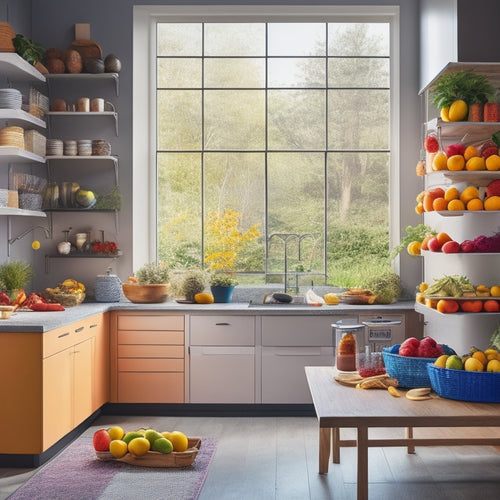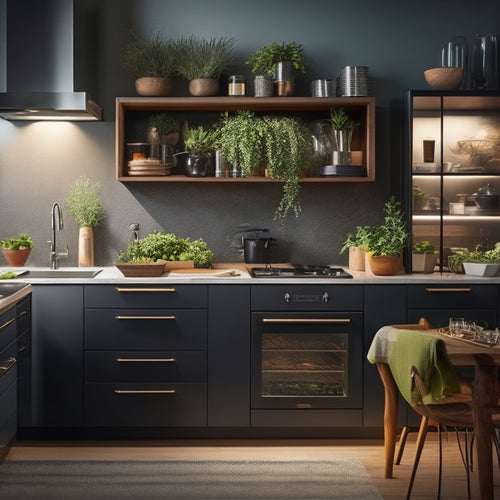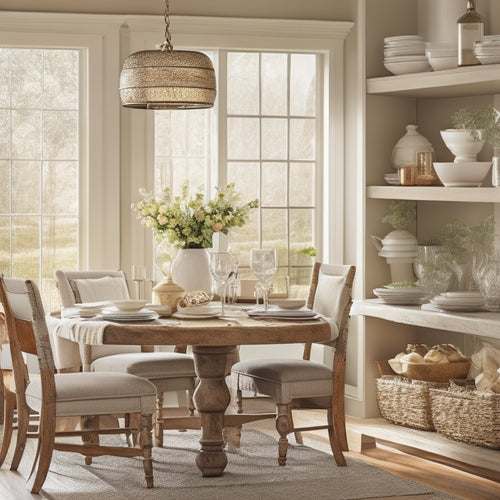
Streamline Your Compact Kitchen With These 5 Strategies
Share
You can revolutionize your compact kitchen's functionality and style by implementing these 5 strategies. Start by maximizing vertical storage space with floor-to-ceiling shelves and sleek, modern designs. Optimize corner cabinets with curved shelves and Lazy Susans for easy access. Utilize hidden storage areas like sliding drawers and secret compartments to keep clutter at bay. Enforce a 'one in, one out' rule to maintain a curated collection of essentials. Finally, designate zones for efficiency, like separate stations for cooking and prep work. By applying these strategies, you'll reveal a harmonious and highly functional kitchen that sparks creativity.
Key Takeaways
• Maximize vertical storage space with floor-to-ceiling shelves or storage units to create a more efficient kitchen environment.
• Optimize corner cabinet organization with curved or angled shelves, Lazy Susans, and adjustable shelving for easy access and flexibility.
• Utilize hidden storage areas like sliding drawers, secret compartments, and wall-mounted shelves to keep infrequently used items out of sight.
• Implement a 'one in, one out' rule to maintain a curated collection of kitchen essentials and prevent clutter buildup.
• Designate zones for efficiency by dividing the kitchen into distinct task stations to reduce clutter and increase productivity.
Maximize Vertical Storage Space
Install floor-to-ceiling shelves or storage units to capitalize on every inch of available wall space, effectively doubling your kitchen's storage capacity. This strategic move will create a sense of airiness while keeping essential items within easy reach.
As you plan your shelving solutions, consider the aesthetic appeal of sleek, modern designs that blend seamlessly with your kitchen's style.
When it comes to ceiling installation, select a system that allows for adjustable shelves to accommodate items of varying sizes. This flexibility will enable you to store everything from cookbooks to infrequently used serving dishes, keeping them dust-free and out of the way.
To maintain a sense of openness, opt for shelving with a minimalist profile or incorporate decorative trim to conceal any visible hardware. By maximizing your kitchen's vertical storage space, you'll create a more efficient, functional, and visually appealing environment that's perfect for serving others.
Optimize Corner Cabinet Organization
By strategically designing your corner cabinets with curved or angled shelves, you'll optimize the full potential of these often-wasted spaces, effortlessly accessing cookware, utensils, and ingredients while maintaining a sense of visual harmony within your compact kitchen.
This thoughtful approach enables you to create a seamless workflow, making meal prep a breeze for you and your loved ones.
To take it to the next level, consider incorporating a Lazy Susan into your corner cabinet design. This clever feature allows you to rotate and access items with ease, eliminating the need to dig through cluttered shelves.
Additionally, Adjustable Shelving can be a game-changer, providing flexibility to accommodate items of varying sizes and shapes. By doing so, you'll create a sense of fluidity and cohesion, making your kitchen feel more spacious and inviting.
With these design elements in place, you'll be able to whip up meals with confidence, knowing that every ingredient and utensil is within easy reach. Your compact kitchen will transform into a haven of efficiency, where cooking and sharing meals with others becomes a true delight.
Utilize Hidden Storage Areas
Behind closed doors, cleverly concealed storage areas await, ready to be leveraged to stash infrequently used items, keeping your compact kitchen's visual landscape uncluttered and serene. You can install sliding drawers or shelves within your cabinets to maximize storage capacity.
Consider adding a step stool with built-in storage to access hard-to-reach shelves while keeping cleaning supplies or infrequently used cookware within easy reach.
Look for opportunities to create secret compartments, such as a false bottom in a drawer or a hidden shelf behind a decorative trim. These clever hiding spots can store valuable items like fine china, cookbooks, or even kitchen gadgets.
When designing your hidden storage areas, think vertically to optimize the use of space. Install wall-mounted shelves, hooks, or a pegboard to hang items like pots, pans, or utensils, keeping them organized and out of the way.
Implement a "One In, One Out" Rule
As you acquire new kitchen essentials, adopt a 'one in, one out' rule to maintain a curated collection of items that sparks joy and serves a purpose, ensuring your compact kitchen remains clutter-free and functional.
This approach helps you stay mindful of what you bring into your kitchen, preventing the buildup of unnecessary items that can lead to a clutter mindset.
Every time you introduce a new item, get rid of an old one to maintain a balanced and harmonious space. This rule not only keeps your kitchen organized but also helps you purge anxiety triggered by clutter.
By being intentional about what you keep, you'll create a peaceful and inviting atmosphere that makes cooking and entertaining a joy. Remember, a well-curated kitchen isn't only visually appealing but also more efficient, allowing you to focus on what matters most – serving others with love and care.
Designate Zones for Efficiency
You'll maximize the functionality of your compact kitchen by dividing it into distinct zones, each dedicated to a specific task, allowing you to move seamlessly from one activity to the next.
This strategic approach is rooted in workflow analysis, where you identify the tasks you perform most frequently and create separate stations for each. By segregating tasks, you'll reduce clutter and increase productivity.
For instance, designate a zone for food preparation, complete with a chopping board, utensils, and a trash can. Another zone can be dedicated to cooking, with the stovetop, oven, and cooking utensils within easy reach. A third zone can serve as a cleaning station, housing the sink, dishwasher, and cleaning supplies.
By grouping similar tasks together, you'll create a harmonious workflow that streamlines your cooking process. The result? A more efficient, aesthetically pleasing kitchen that makes serving others a breeze.
Frequently Asked Questions
How Do I Choose the Right Kitchen Cart for My Compact Kitchen?
'When selecting a kitchen cart, you'll want to contemplate Cart Materials, like durable woods or sleek metals, and make sure Cart Dimensions fit your space, then envision how the style will harmonize with your kitchen's aesthetic, serving up functionality and flair.'
Can I Use a Kitchen Island in a Very Small Kitchen?
"Can you really fit an island in a tiny kitchen? Yes, you can! Consider island placement near a wall or corner, and use island hacks like a foldable or nesting design to maximize space and functionality."
Are There Any Space-Saving Alternatives to Traditional Kitchen Tables?
You're looking for space-saving alternatives to traditional kitchen tables! Consider folding tables that tuck away or drop-leaf designs that fold up against the wall, creating a sleek, minimalist aesthetic that serves your guests without cluttering your space.
How Can I Incorporate a Kitchen Desk Into a Compact Kitchen?
You'll love how a foldable workspace or hidden nook can transform your compact kitchen into a multitasking hub, allowing you to prep, work, and create while keeping clutter at bay and style intact.
Are Compact Refrigerators a Good Option for Small Kitchens?
You'll love compact refrigerators for small kitchens, as they're energy-efficient and adapt to space constraints. Visualize a sleek, slim design that fits snugly, freeing up floor space while keeping your favorite beverages chilled and within reach.
Related Posts
-

Space-Saving Tiered Racks for Kitchen Storage
Space-saving tiered racks are your best solution for maximizing kitchen storage. They employ vertical space, allowing...
-

Smart Kitchen Countertop Storage Innovations
Smart kitchen countertop storage innovations are transformative for maximizing your kitchen's potential. You can clea...
-

Corner Cabinet Storage for Dinnerware Sets
Corner cabinet storage for dinnerware sets can change your kitchen into an organized, stylish space. By utilizing ver...


